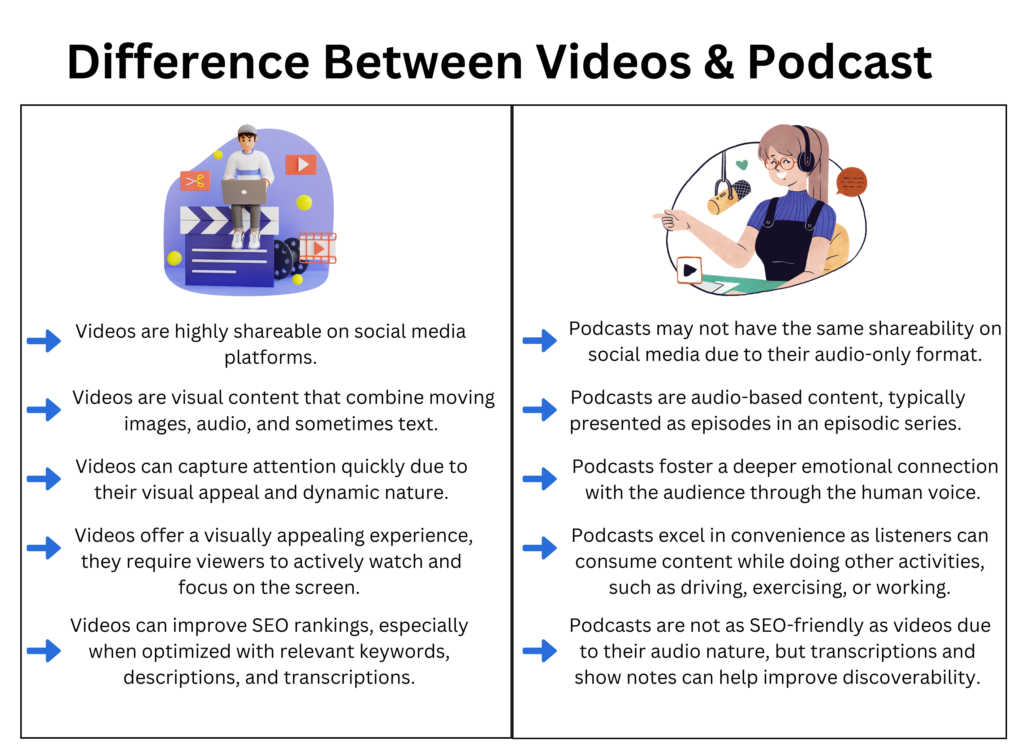Table of Contents
Introduction
Welcome to the world of B2B marketing where content is king! From blogs to videos, businesses have been leveraging various forms of content to engage with their audience. However, with the rise of podcasts in B2B marketing, companies are now exploring a new avenue to connect with their customers.
In this blog, we will delve into why B2B marketers are turning to podcasts as an essential component of their content strategy. From amplifying brand visibility to offering long-form discussions on complex topics, podcasts open a gateway to a new realm of storytelling and communication.

Advantages of using Podcast in b2b marketing
B2B marketing is the process of promoting and selling products or services to other businesses. It involves understanding the needs and goals of the business and creating marketing strategies that address those needs effectively.
Here are some key advantages of using podcasts in B2B marketing:
- Podcasts provide a captivating and immersive experience, allowing businesses to connect with their target audience on a deeper level.
- Podcasts offer the flexibility to consume valuable content while commuting, exercising, or doing other tasks, providing a convenient way to stay updated with industry insights.
- By hosting engaging discussions and interviews, B2B companies can establish themselves as authoritative voices in their field, gaining credibility among their audience.
- B2B marketers to delve deeply into complex topics, providing comprehensive insights that resonate with their audience.
- Podcast content can be repurposed into various formats, such as blog posts, social media snippets, or video scripts.
- Regular podcast episodes allow B2B companies to establish a consistent and ongoing relationship with their audience.
- Collaborating with thought leaders can lead to cross-promotion and new business connections.
- B2B marketers can use podcasts to discuss and analyze current industry trends, challenges, and innovations.
Blog vs Podcast: Which is Best for b2b Marketing?
While both blogs and podcasts have their merits, podcasts offer several advantages that make them a better choice compared to blogs in certain contexts. Here are some reasons why podcasts are superior to blogs:
- Podcasts create a more intimate and immersive experience for the audience.
- Multitasking capability allows to consume content without dedicating exclusive time for reading, as required by blogs.
- The human voice in podcasts establishes a deeper connection with the audience. While blogs can be engaging, they primarily rely on written language to capture attention.
- The conversational nature of podcasts allows businesses to inject personality, humor, and authenticity into their content, creating a more genuine connection with the audience.
- Blogs can showcase brand personality, but the written format may not convey authenticity as effectively as the human voice.
- Podcast transcripts and show notes can enhance SEO, audio content is not as easily discoverable by search engines.
- Podcast production involves recording, editing, and possibly conducting interviews, making it more time-consuming and cost-intensive. While writing and editing blogs generally require less time and resources compared to producing high-quality podcasts.
In conclusion, while blogs have their advantages, they lack the personal touch and accessibility that podcasts provide. Podcasts provide an easier and more engaging way to consume content, bringing a refreshing perspective to B2B
Videos vs Podcast: Differences and possibilities
Videos and podcasts are two popular content formats that offer unique ways to engage audiences and deliver information. Let’s explore the key differences between videos and podcasts, as well as the possibilities each format brings in terms of content creation and audience reach.

Possibilities
- Businesses can combine videos and podcasts to create a multimedia content strategy.
- Transcripts of podcasts can be transformed into blog posts or articles, maximizing the reach and SEO benefits of the content.
- Both formats offer opportunities for collaborating with industry experts, influencers, or customers, providing valuable insights and strengthening relationships.
- Host live video webinars where experts discuss industry trends, share valuable insights, and answer audience questions in real-time.
- Conduct podcast interviews with industry thought leaders, influencers, or satisfied customers.
By understanding the differences and possibilities of each format, businesses can create a well-rounded content strategy that engages audiences, drives brand awareness, and achieves marketing goals effectively.
Tips For Successful implementation of Podcasts in B2b marketing
- Specify your goals
- Identify your target audience
- Create Engaging Content
- Keep it informative and engaging
- Invest in high-quality audio
- Build a strong brand image
- Optimize for SEO
- Promote your podcast effectively
- Collaborate with Industry Experts
- Analyze and refine
- Share Valuable Insights, Not Just Promotions
- Repurpose Content
- Create a Podcast Website
- Monitor Reviews and Feedback
- Monitor Industry Trends
Conclusion
Podcasts have become an essential part of B2B marketing. Given their growing popularity, integrating podcasts into your marketing efforts can help you capitalize on their potential and garner significant benefits. The growing importance of podcasts lies in their ability to provide easy access, offer a unique perspective, showcase personality, and increase audience engagement. Blogs or videos and podcasts provide distinct benefits that cater to the preferences and habits of modern business audiences.
- Podcasts offer a more intimate and immersive experience for listeners. The audio format allows for multitasking, enabling busy B2B professionals to consume valuable content during their commutes, workouts, or while performing other tasks. This accessibility and flexibility result in higher engagement and a deeper connection with the audience.
- Secondly, podcasts foster a sense of authenticity and credibility. Hearing the voices of industry experts, thought leaders, or satisfied customers builds trust and establishes the hosting company as a knowledgeable and reliable source within its niche. This can greatly enhance brand authority and thought leadership.
- Lastly, podcasts can complement existing content marketing efforts. Transcribing podcast episodes into blog posts, extracting key points for social media promotion, or creating short video snippets from podcast content opens up various avenues for repurposing and maximizing content visibility.

